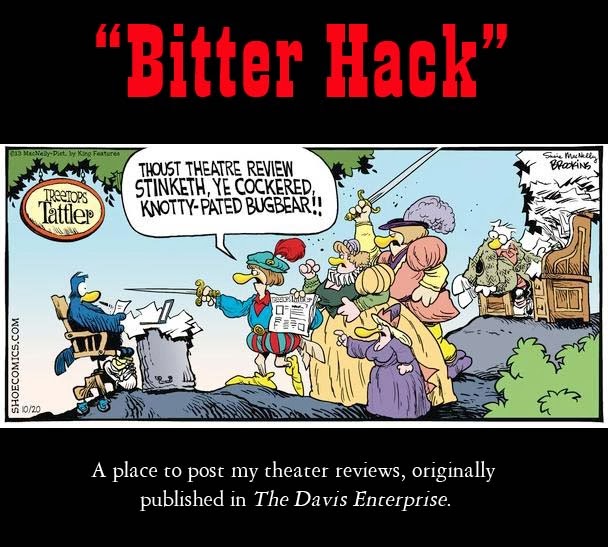There are people who love Shakespeare and people who love Jane
Austen. I love musical theater. I’ve loved musical theater all of my
life. There are some shows I like better than others.
“Guys and Dolls,” currently at Music Circus, was never one of my
favorites. It’s OK. I’ve seen the movie several times and have reviewed
the stage show five times and was never blown away — until I saw this
Music Circus production.
My word, is it wonderful!! I may have to move the show into my “favorites” category.
This musical by Jo Swerling and Abe Burrows — based on short stories
by Damon Runyon, with music and lyrics by Frank Loesser — is set on the
streets of New York in the 1940s, and the characters are so
stereotypically delicious that we can’t help falling in love with them.
These are the lowlifes, gamblers, showgirls and gangsters, and the Salvation Army-like missionaries who try to save their souls.
While everyone in the show is terrific, the real “star” of the show
is choreographer Michael Lichtefeld, who has created fabulous dance
numbers that blend seamlessly with the storyline. Particularly wonderful
was the dance during the overture.
Kudos also to costume designer Marcy Froelich for all those terrific
1940s “gangsta” costumes, especially the wonderful striped suit of
Nathan Detroit (Jeff Skowron), desperately trying to find a place to
hold his “oldest established floating crap game” in New York, now that
Lieutenant Brannigan (Ron Wisniski) is hot on his tail and has managed
to seal up all the “usual” places.
It is particularly necessary to find a place to accommodate “Big
Jule,” in from Chicago and ready to play. Jerry Gallagher is a wonder.
Head and shoulders above everyone else, he is a talented hulk who
personifies someone named “Big Jule” and the actor’s bio says he has
played this role all over North America and Europe and even on a cruise
ship.
Into the world of the dedicated gamblers come the Salvation Army-type
missionaries, trying to win souls for God, especially naive, idealistic
Sarah Brown (Ali Ewoldt), under the guidance of paternal Arvide
Abernathy (Lenny Wolpe), whose love for Sarah is expressed beautifully
in “More I cannot wish you.”
Charming gambler Sky Masterson (Edward Watts), who has a girl in every port, sets his sights on Sarah.
From the first moment of their meeting, sparks fly between the two actors and the chemistry is magic.
Detroit has been engaged for 14 years to the long-suffering Miss
Adelaide (Lesli Margherita), a singer and dancer at The Hot Box; she’s
beginning to worry that they’ll never get married. Adelaide only dreams
of settling down in a real home with Nathan.
Their duet, “Sue Me,” is a true crowd-pleaser.
There is a whole stable of wonderful cast members, led by Michael
Paternostro as Benny Southstreet, Carlos Lopez as Harry the Horse, and
Evan Harrington as Nicely-Nicely Johnson, who delivers the show-stopping
“Sit Down, You’re Rockin’ the Boat.”
The popularity of, and enduring affection for, Frank Loesser’s “Guys
and Dolls” is easily seen in its award history. It swept the Tonys in
1951, the year it opened on Broadway (where it ran for 1,200
performances), winning not only “Best Musical,” but also awards for Best
Actor, Actress, Director and Choreographer.
It had nominations again for Best Actor (Jerry Orbach) in 1965 and was nominated in 1977 for Best Revival of a Musical.
In 1992, it again won an award for Best Revival of a Musical, as well
as awards for Director, Choreographer and Actress, with four additional
nominations for the revival. In 2009, it was again nominated for Best
Revival.
Various productions also hold Drama Desk awards, Olivier awards and
Helpmann awards. It was picked to receive the 1951 Pulitzer Prize but
because Burrows had been investigated by the House Unamerican Activities
Committee, the trustees of Columbia University chose to withhold the
award, so no Pulitzer for drama was awarded that year.
Guys and Dolls has a number of familiar tunes (“I’ll Know,” “I’ve
Never Been in Love Before,” “If I Were A Bell,” “Luck Be A Lady”). It
would be surprising if the audience did not emerge humming one of them
at the end of the evening.























